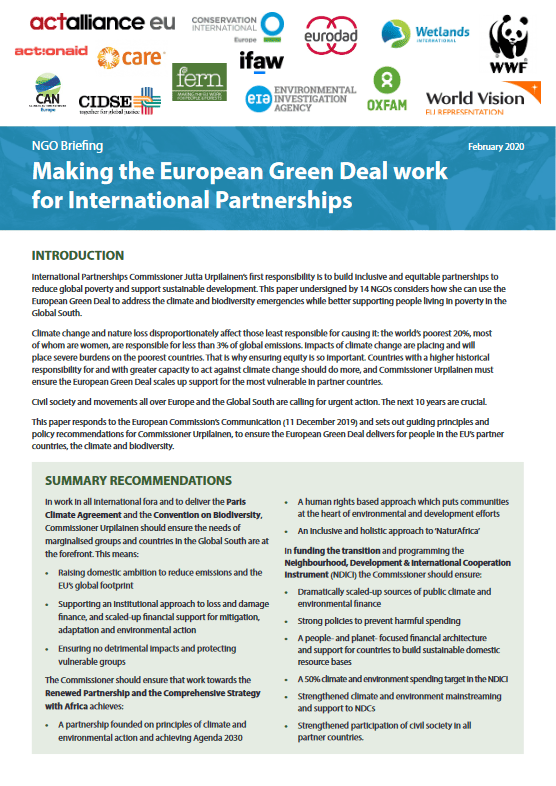Executive Summary
Commissioner Jutta Urpilainen, tasked with fostering inclusive and equitable partnerships for sustainable development, faces the challenge of leveraging the European Green Deal (EGD) to combat climate change and biodiversity loss while supporting impoverished populations in the Global South. This paper, endorsed by 14 NGOs, presents guiding principles and policy recommendations for Urpilainen to maximise the EGD’s impact on partner countries, aligning with the European Commission’s Communication of December 11, 2019.
Guiding principles
Policy Coherence for Sustainable Development: The EU must uphold the ‘do no harm’ principle and ensure its policies support sustainable development in partner countries, reflecting commitments under the Lisbon Treaty and Agenda 2030. To meet the EGD’s climate goals, the EU’s emission reduction targets should be significantly raised, with a focus on domestic reductions to avoid adverse impacts on the Global South.
Mainstreaming Climate and Environment: Acknowledging the intertwined nature of climate change and biodiversity loss, the EGD should integrate climate and environment considerations into EU development cooperation. Promoting nature-based solutions and phasing out finance for fossil fuels are essential steps in this direction.
Gender Equality: Gender considerations must be central to climate and environmental policies, recognising women’s vulnerability to climate risks and their role as agents of change. The EU’s development efforts should prioritize gender equality and support women’s participation in climate action.
Human Rights-Based Approach: Upholding human rights is fundamental to achieving environmental objectives. Policies must ensure compliance with human rights standards and support community-led solutions, while holding corporations accountable for violations.
Inclusiveness and Participation: Civil society and grassroots initiatives play a crucial role in climate action. The EU should engage with and support these actors, promoting inclusive dialogue and participation in decision-making processes.
Recommendations: Green Deal Diplomacy & Green Alliances
Supporting equitable international policies and frameworks which build synergies between biodiversity, climate action and the SDGs will be crucial to their success. Special attention should be given to least developed countries and leaving no one behind. The following recommendations should guide Commissioner Urpilainen’s and the EU’s approach.
Paris Agreement and Convention on Biodiversity: The EU should lead by example, increasing its emission reduction targets and championing ambitious global frameworks for climate and biodiversity conservation. It must also provide financial support to mitigate the impacts of climate change and biodiversity loss in vulnerable countries.
Renewed Partnership and Comprehensive Strategy with Africa: Any strategy with Africa should prioritize climate and environmental action, respecting the rights and needs of local communities and indigenous peoples. Investments should support sustainable development and environmental protection, with a focus on inclusive governance and community consultation.
Recommendations for Funding the Transition and the Neighbourhood, Development, and International Cooperation Instrument (NDICI)
The Communication shows a worrying reliance on private finance to fill gaps in funding the transition. While we welcome current EU development assistance and climate finance contributions, multiple countries in the Global South intend to enhance their NDCs in 2020, and the challenges faced by them demand significant scaling up of finance including public and grants-based finance. The following recommendations can guide the Commissioner to a greener and more equitable approach.
Funding the Transition: The EU must scale up sustainable finance for climate mitigation, adaptation, and loss and damage, ensuring it is new and additional to existing aid commitments. Climate and environment spending should be prioritized in future budgets, with robust safeguards against harmful activities.
Programming Process: Climate and environment considerations should be integrated throughout the programming cycle, with a focus on strengthening resilience and disaster risk reduction. Support for the implementation of Nationally Determined Contributions (NDCs) and biodiversity conservation plans is essential, alongside dialogue with civil society and indigenous groups.
